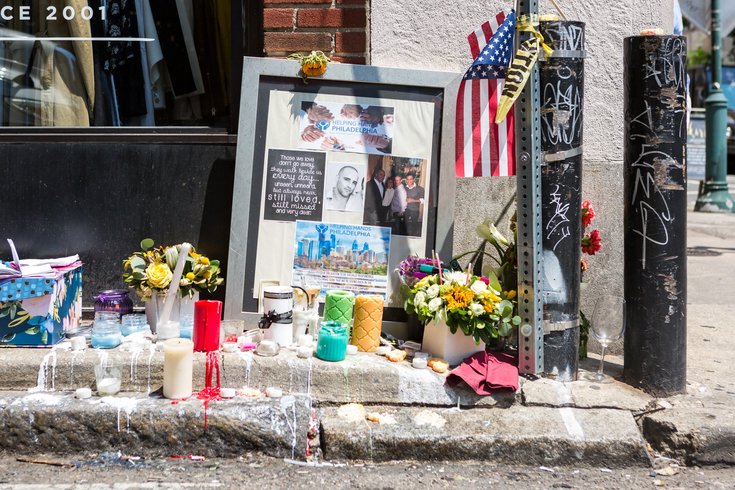
September 27, 2023
 Thom Carroll/for PhillyVoice
Thom Carroll/for PhillyVoice
A new docuseries, '72 seconds in Rittenhouse Square,' reexamines the 2018 stabbing death of Sean Schellenger. Above, a memorial assembled by friends and family at Chancellor and 17th streets in 2018.
The latest Paramount+ docuseries is ostensibly about the 2018 stabbing death of Sean Schellenger. But over the course of three episodes, "72 Seconds in Rittenhouse Square" spins a much bigger story of criminal justice and racism in Philadelphia.
Through interviews and never-before-released audio recordings, the show retells the events of July 12, 2018. That's when Schellenger, a white, 37-year-old real estate developer, and Michael White, a Black, 20-year-old Uber Eats deliveryman, crossed paths in the affluent Center City neighborhood.
What began as a supposed traffic altercation apparently escalated as Schellenger exited his car and White dismounted his bike, both men exchanging words. A physical fight ensued, and when it ended, Schellenger had a fatal knife wound.
There was no question that the knife belonged to White's – video shows him wielding it – but his intent became a matter of considerable debate. White claimed he was acting in self-defense against an aggressive man yelling racial slurs at him, while the Schellenger family insisted Sean had been killed by a young man with an axe to grind. A jury acquitted White of voluntary manslaughter in 2019, after Philly D.A. Larry Krasner withdrew a more severe charge of murder.
As "72 Seconds in Rittenhouse Square" reviews these details with Philadelphia activists, lawyers and the families of both White and Schellenger, it also places the case in the wider context of criminal justice in the city. By invoking the history of racism in local law enforcement and contentious reforms at the district attorney's office, the docuseries becomes a study of crime and punishment in Philadelphia — and the ongoing struggle to make it more equitable.
Here are a few key moments referenced in the show:
Before he became the 93rd mayor of Philadelphia, Frank Rizzo presided over the city's police department. His time as commissioner was marked by brutality and racism, a legacy exemplified by a 1970 incident mentioned in the docuseries.
On Aug. 31, Philadelphia police raided three offices of the Black Panther Party, hauling several young men into the streets. Officers ordered them to strip to their underwear in front of the media, who snapped photos, before placing them in handcuffs and taking them to jail. Some of those men said they were not only humiliated, but beaten or threatened with guns.
Reggie Schell, an organizer for the party, claimed, "Each cop took an individual Panther and placed their pistol up the back of our neck and told us to walk down the street backyard. They told us if we stumble or fall they're gonna kill us. Then they lined us up against a wall and a cop with a .45 sub would fire over our heads so the bricks started falling down."
The raid came after four police officers were killed or wounded during a violent weekend in late August. Though the Black Panthers were not linked to the killings, Rizzo used them as the pretense to prevent the Black Panthers Party from holding a national convention in Philadelphia in September. The convention ended up being held under police surveillance.
Nearly 40 years ago, the Black journalist Mumia Abu-Jamal was convicted of murdering Philly police officer Daniel Faulkner — and to this day, the case is still highly contested.
The two men's fatal encounter began in the early morning hours of Dec. 9, 1981, when Faulkner, who was white, pulled over Abu-Jamal's brother William Cook. A physical altercation ensued, which Abu-Jamal witnessed. He ran over to the scene and, according to prosecutors, shot Faulkner, who returned fire, hitting Abu-Jamal in the stomach.
According to Abu-Jamal, someone else fired the fatal shot. A jury found him guilty, and his subsequent appeals for a new trial have been denied, though his death sentence was overturned. But civil rights activists, including Colin Kaepernick and Angela Davis, have argued that Abu-Jamal did not receive a fair trial due to his race, and have continued to press for his release.
Krasner, who was elected district attorney in 2017 on a reform platform, is a key figure in "72 Seconds in Rittenhouse Square." As the city's top prosecutor, he coordinated his team's engagement with White and ultimately decided on the charges against him, sparking considerable anger from Schellenger's parents Linda and Mark. But the progressive DA was no stranger to controversy.
The docuseries references one of his first acts as district attorney, a mass firing now known as the "Snow Day Massacre." On his fourth day in office, Krasner fired 30 prosecutors whom he felt did not align with his vision for ending mass incarceration, a choice Krasner's critics claimed was proof of his disdain for the office. It was in the middle of a snowy January day, leaving the "blindsided" employees to lumber home in a blizzard.
Though Krasner has continued to face criticism for his brash approach, he won reelection in 2021 with nearly 70% of the vote.
Follow Kristin & PhillyVoice on Twitter: @kristin_hunt
| @thePhillyVoice
Like us on Facebook: PhillyVoice
Have a news tip? Let us know.